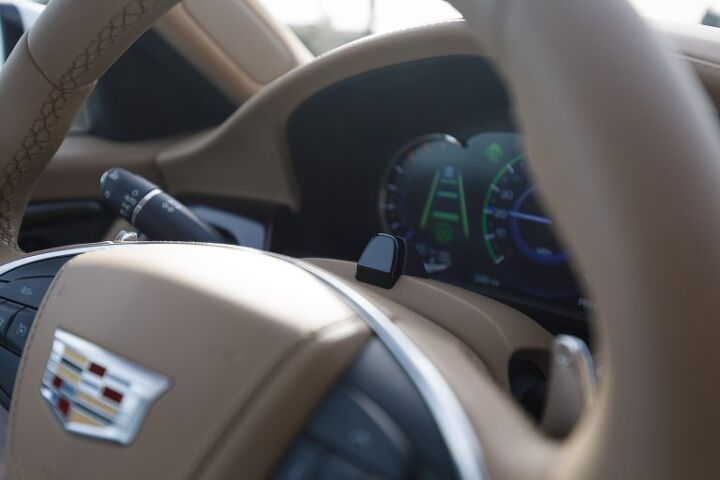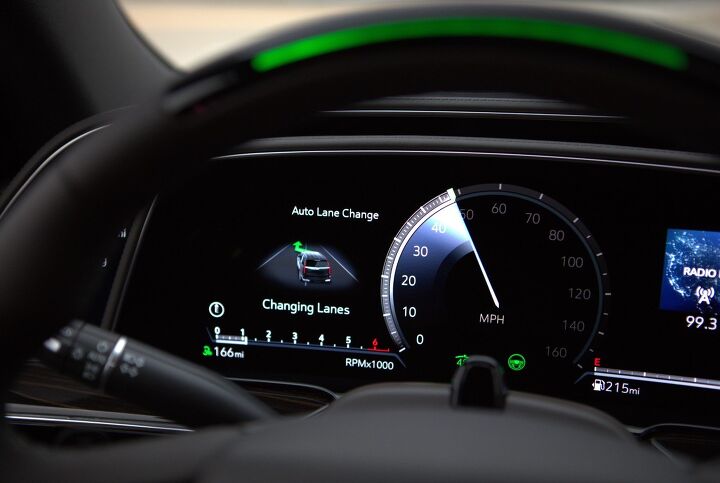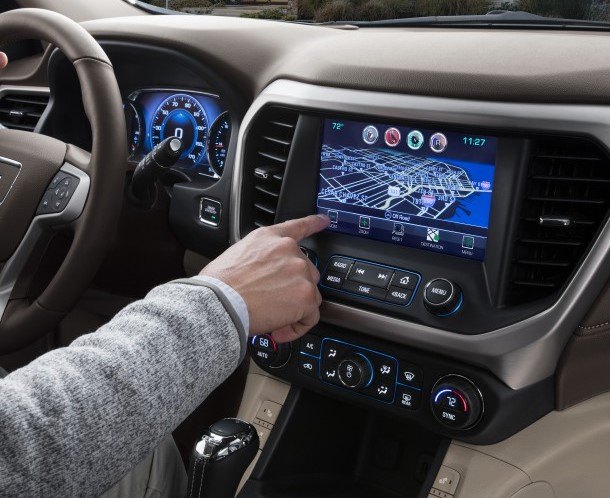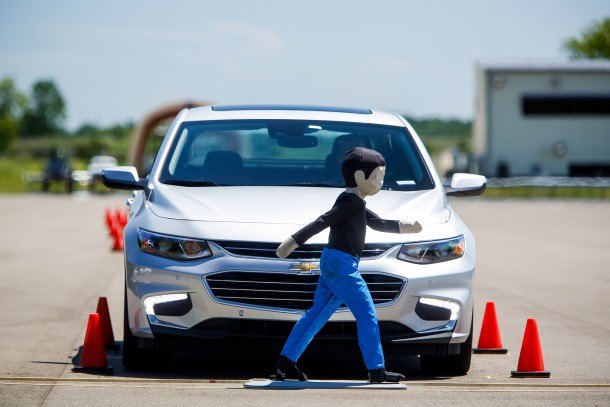#Semi-autonomous
IIHS Study Suggests Buyers of Used Vehicles Learn Less About Their Car
The Insurance Institute for Highway Safety (IIHS) is claiming that individuals shopping for a secondhand automobile end up learning less about the modern features lurking within their automobiles. Considering salespeople have meetings about how best to hype the advanced driving aids in new models, this one really shouldn’t have required a survey for the IIHS to piece it together. But the outlet appears to be attempting to link this alleged lack of knowledge to make claims that it’ll somehow contribute to the probably of used vehicles being involved in a crash.
“Used car buyers were substantially less likely than new car buyers to know about the advanced driver assistance features present on their vehicles,” stated IIHS Senior Research Scientist Ian Reagan, the author of the study. “They were also less likely to be able to describe how those features work, and they had less trust in them. That could translate into less frequent use, causing crash reductions from these systems to wane.”
AAA Endorses Driver-Monitoring Camera Systems
Despite the automotive industry collectively promising to commence deliveries of self-driving cars in 2019, autonomous vehicles have remained test platforms for technologies that don’t yet seem ready for mass consumption. Public perception of the concept has also endured a few setbacks after several fatalities involving partially autonomous vehicles received national media attention. Today, the relevant technologies have failed to mature as swiftly as indicated and there are a whole host of legal ramifications to contend with.
Selling an automobile that’s marketed as being able to drive itself (even partially) are exposing automakers to a whole new demographic of lawsuits, so they’re desperate to install failsafe measures that places the onus of responsibility back onto the driver. Their current favorite is driver-monitoring cameras, which the American Automobile Association (AAA) likewise believes are probably the best solution. The outlet recently shared the results of a study attempting to determine which driver-engagement systems worked best and decided that in-cabin cameras were the leading choice in a batch of bad options.
IIHS Takes a Dump on Semi-Autonomous Cars, Then Impositions Drivers
The Insurance Institute for Highway Safety (IIHS) has said it is developing a new rating system to evaluate the existing safeguards found inside vehicles equipped with partial automation. Considering how commonplace advanced driving aids have become, you might be thinking this was long overdue. However, insurers were blindly praising advanced driving suites a few years ago — until they actually started testing them in earnest.
As luck would have it, there’s been mounting research supporting claims modern automotive tech encourages drivers to tune out and become distracted. While this wouldn’t be a big deal if the relevant features all functioned perfectly, the reality is that most are far less effective than advertised and practically all of them run the risk of being completely undone by inclement weather or poor lighting. Confusingly, the IIHS believes the best solution here is to make sure systems constantly monitor the driver to ensure the driver is constantly monitoring the system.
Land Rover Developing Remote Driving for Defender
Jaguar Land Rover is reportedly working a system for the new Defender that would allow for low-speed maneuvers with all occupants outside the car. While it sounds like a good way to guarantee the safety of friends and family when traversing a cliff face that might be a bit too narrow, recent hiccups with Tesla’s new summoning tech has proven it’s best to exercise caution.
Fortunately, Land Rover says it wants to utilize the Defender’s 3-D Scout system to map the area surrounding the vehicle and allow drivers to control the Defender remotely from the outside in off-road environments (minimizing collision risks). This will likely require the addition of some level of vehicular autonomy, as JLR stipulates drivers will be controlling the model via the automaker’s wearable “Activity Key.” Present incarnations of the device are basically proximity sensors without the necessary controls to accomplish any meaningful level of remote control.
Scary Stats: Drivers Don't Know Jack About the Tech In Their Car
Over the weekend, I found myself conversing with a young woman who admitted to being slightly creeped out by modern automotive technology. She had a bone to pick with everything from push-button ignitions to adaptive cruise control. It was surprising admission from an individual who is planted squarely in the middle of the Millennial age bracket and has no serious interest in cars, but one I’ve been hearing more often lately.
The American Automobile Association seems to be rather touchy on the issue, as well. Much of its interest in the subject revolves around present-day tech lending itself to distracted driving, something it is firmly against. But the AAA Foundation for Traffic Safety appears absolutely convinced that the introduction of advanced driver assistance systems will save lives. However, it also believes that its full potential won’t be unlocked until consumers accept these technologies, understand how to use them, use them as intended, and avoid misusing or becoming over-reliant on them.
Frankly, that sounds like wishful thinking. So long as advanced driving aids exist, they’ll probably be misunderstood and misused. People don’t even use their turn signals correctly, for Christ’s sake.
Tesla's Latest Update Killed Some Vehicles' Autopilot
Tesla’s latest over-the-air update appears to have caused at least a few drivers to lose all Autopilot functionality. While the vehicles seem otherwise intact, the semi-autonomous driving mode that was supposed to be improved by the latest firmware installation ended up a little buggy. That’s unfortunate for Tesla — a company that could do without additional bad publicity.
Luckily, minor software issues are exactly that — minor. This isn’t on the same scale as Tesla’s CEO promising to go public or pretending to smoke weed online. It isn’t even as big of a deal as the company losing another high-ranking executive, which also happened this week.
Maybe Tesla Vehicles Could Use a Seat-shaker Feature…
Hell, maybe they could use a driver monitoring camera, too. In other words, Cadillac’s Super Cruise system. How else would one react to seeing this video of a Tesla employee apparently dozing behind the wheel of a Model S while flying down a California highway?
The video, uploaded by YouTube user Mike Cagulada and posted on Twitter by Amir Efrati of The Information, was apparently shot near Tesla’s Fremont assembly plant on June 4th. By the looks of it, this driver isn’t bobbing for apples — he or she is asleep.
Here's What Utah Police Discovered About the Final Trip of That Tesla Model S
A few days after last Friday’s collision between an Autopilot-enabled Tesla Model S and a stopped fire department truck, police in South Jordan, Utah blew away the clouds of speculation by stating the Tesla driver was looking at her phone immediately prior to the collision. Witnesses claim the car, piloted by an on-board suite of semi-autonomous driving aids, didn’t brake as it approached the traffic signal (and the stopped truck).
Now we know the entirety of what occurred in the car in the minutes preceding the 60 mph impact.
Tesla Model S Crashes While on Autopilot, Leads to Musk Vs. the Media
When is an accident not just an accident? When it involves a Tesla, according to Elon Musk. The electric automaker’s CEO took to Twitter to lambaste the media Monday night for reporting on the high-speed collision between a Tesla Model S and a stopped fire truck in Utah last Friday.
It’s true, a collision resulting in minor injuries usually only warrants a brief mention in local media, if that. However, context is key. When it’s revealed that Tesla’s semi-autonomous Autopilot system was activated at the time of the collision, sorry, that’s news.
Tesla Driver Offers Further Proof People Are Complete Idiots
If you’re wondering how many times this website has complained about people mishandling semi-autonomous driving systems, we’ve completely lost count. However, if you want further evidence that we are justified in constantly wringing our hands over the matter, you’re in luck.
On April 20th, Bhavesh Patel plead guilty to “dangerous driving” at St. Albans Crown Court in the United Kingdom. The term driving is a bit of a misnomer, though. Because Patel was actually sitting in the passenger seat of his Tesla Model S 60, while his vehicle traveled down the motorway driver free. The incident, which took place in May of last year, was caught by a fellow commuter and subsequently reported to authorities. Obviously, we had to find footage of the unbridled stupidity.
Waymo Comments on Autopilot Crash, Blames Driver
While the investigation into Tesla’s most recent Autopilot-rated fatality continues, Waymo chimed in to remind everyone that the company’s self-driving system isn’t actually self-driving at all. That almost makes it sound like the Google offshoot is coming to the defense of Tesla Motors. However, the truth of the matter is this was a golden opportunity for Waymo to sneak in another humblebrag that its autonomous technology is the genuine article and that most of its competitors are playing catch-up.
It’s a valid point. We shouldn’t forget that Tesla’s Autopilot is not representative of true autonomy and the burden of safety still falls squarely on the driver. But the manufacturer didn’t always market it that way, and only updated the system to require hands on the wheel after the first fatality. This incident is different from the recent Uber crash in Tempe, Arizona. But just how different is debatable and largely dependent on what qualifies as “self-driving” to the average person.
“Tesla has driver-assist technology and that’s very different from our approach,” explained Waymo CEO John Krafcik last week, before Tesla revealed that Autopilot was engaged during the Model X crash. “If there’s an accident in a Tesla, the human in the driver’s seat is ultimately responsible for paying attention. We don’t know what happened here, but there was no self-driving.”
When Will Automatic Braking Become Standard Equipment?
There was a time when seat belts were considered unnecessary, reserved as an optional extra for motorists who ventured out onto roadways in a state of white-knuckle fear. What pathetic bags of flesh, many thought, wrapping themselves in a polyester harness because they can’t handle themselves on the road — thinking it will save them from the reckoning of sheet metal and glass.
We know better now. Seat belts are proven life savers and advanced restraint systems are compulsory for both automakers and occupants. That will likely be the path of automatic emergency braking takes as well. Nissan announced Thursday it would make auto braking systems standard on a large portion of 2018 models sold in the United States. Toyota is doing the same. But the technology is not yet ubiquitous, nor has it acquired universal public approval. Many worry it could be too invasive or provide a false sense of invincibility, so it could be a while before AEB becomes expected equipment on all new models.
TTAC News Round-up: Kia's Big Show, Porsche's Diesel Fix and Mller Says VW Just Misunderstood The Law, You Guys
Porsche’s CEO is confident that the fix for their 3-liter diesel Cayennes will be approved by regulators, which is more than Volkswagen can say at the moment.
That, Kia’s big Detroit show, GM’s plan to sell cars online and Volkswagen CEO has a momentarily lapse of logic … after the break!



























Recent Comments